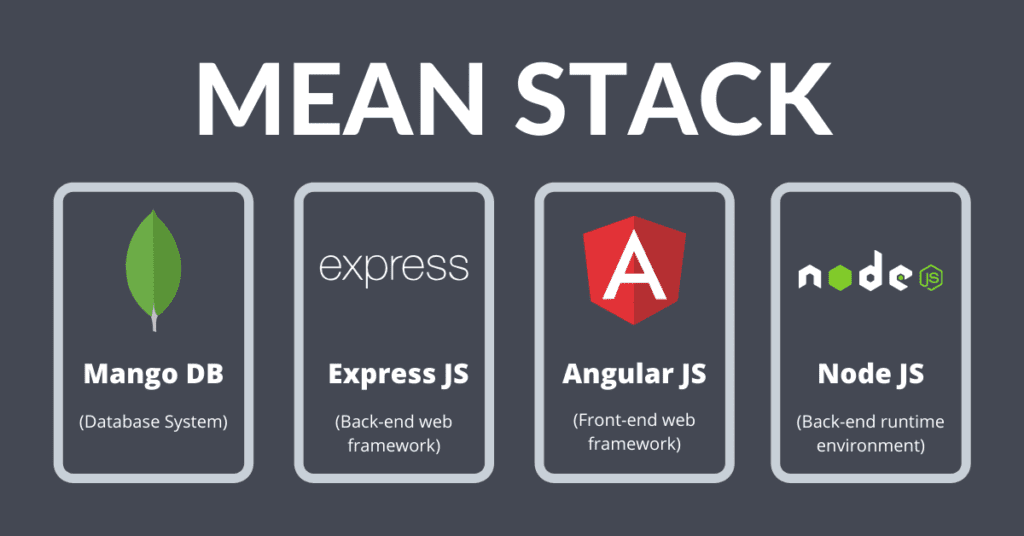Mean Stack is a popular web development term among learners and recruiters as well. Mean Stack is also referred to as the technology stack, and Node JS is an integral part of this Stack. To comprehend the function of Node JS in the MEAN Stack course, you must first understand the concept of technology working behind it.
Before you begin exploring Node.js options in the MEAN stack full course, you may be interested in learning more about the advantages that come with the use of JavaScript across the MEAN stack.
JavsScript technology in Mean stack integrates the language and information format (JSON) to allow you to maximize the reuse of developer resources. We will go into detail about Node.js in this article rather than much discussing the benefits of JavaScript in the Stack.
First of all, you should know about the basics of the MEAN Stack as NodeJS is part of the MEAN full stack developer course.
What is MEAN Stack?


MEAN Stack, which includes NodeJs, is an open-source and free JavaScript stack to create dynamic Web applications. Once you complete your MEAN stack course, you will be proficient in using 4 technologies to develop web applications. Each letter of “MEAN” is the first word of the technologies it is made up of:
M: MongoDB It is a NoSQL database system
E: Express.js: It is a Framework for NodeJs
A: Angular: It is a Client-side JavaScript framework
N: Node.js: It is a javascript webserver
Check out our complete blog on MEAN Stack that covers its importance and career prospects in the web development industry.
Discover Node.Js Before Enrolling In Mean Stack Course
If you are looking forward to pursuing the MEAN stack developer course, then it is an extra benefit to learn some basics of Node.js.
It is open-source for web development, where you can run server-side JavaScript codes. Node.js was developed on the Chrome version 8 JavaScript engine.
Node.js can be used to develop web applications that require a continuous connection between the browser and the server. It’s typically utilized for real-time applications like chat, news feeds and push notifications.
Node.js is among the most popular frameworks for JavaScript. It has its own role in MEAN Stack. I/O model in Node.js help make it more efficient and easy to use. This is also what makes Node.js ideal for developing real-time data-driven applications that can run on different platforms and devices.
In other words, we can define Node.Js as an event-driven block-free I/O and cross-platform runtime environment for creating high-performance, scalable server-side applications by using JavaScript.
MEAN stack course can help you master the fundamentals of Node.js, beginning with the basics up to advanced levels. MEAN stack full course at B2B Campus is divided into sections. Each section has a range of related topics that will make you understood by experienced developers.
What are Modules in Node.js
Modules within Node.js is a basic or more complex function that is composed of a single or several JavaScript files. These files can be reused in your Node.js application.
Every module within Node.js is a part of its context, which means it is not able to interfere with other modules or affect the global scope. Furthermore, each module could be stored in a distinct .js file within a distinct folder.
Node.js follows the CommonJS module’s standard. CommonJS is a volunteer organization that creates JavaScript standards for desktop, web server, and console applications.
There are three types of Node.js Modules
- Core Modules
- Local Modules
- Third-Party Modules
Node.js Core Modules
Node.js is a lightweight framework. The core modules offer basic functions of Node.js. These modules are built into the binary distribution of Node.js and loaded automatically once the Node.js process begins. But, you must install the core module first before incorporating it into your application.
Node.js Local Module
Local modules are those that have been created locally within the Node.js application. They provide different features of your application. They are stored in distinct folders and files.
It is also possible to bundle it for distribution via NPM so that the Node.js community members can utilize it.
Node.js third party module
Once you will be proficient after pursuing the Mean Stack course you will become familiar with many third party modules available online. Those modules are suitable for use in Node.js. You can install those third party modules with the help of Node Package Manager.
Node.Js Allows Building Own Server
To browse the web pages of any website requires a web server. Web servers handle all HTTP requests that are made by websites. Node.js allows you to build your own website server that handles HTTP requests simultaneously.
It is possible to use IIS or Apache to run a Node.js web application, but it is suggested to use the Node.js web servers.
Advantages Of Node.Js You Will Experience After Mean Stack Course
1. Easy to Learn


Because JavaScript is among the most used programming languages, a majority of front-end developers can learn it easily.
Whether you are a novice or know some coding, the MEAN stack course covers learning all the technical aspects of Node.js.
2. Node.Js Is A Single Programming Language
Node.js allows developers to write server-side software in JavaScript. Developers can develop the front-end and the back-end web application using JavaScript with a runtime environment.
3. High Performance


It was previously mentioned in the past that Node.js is able to interpret the JavaScript code using Google’s JavaScript engine. It transforms JavaScript script directly into machine code. This makes it simpler and faster to incorporate the code successfully.
4. Scalability Is Easy With Node.Js
One of the major benefits of Node.js is that developers can find it simple to scale applications in both horizontal and vertical directions. Applications can be scaled horizontally by adding additional nodes to the system.
Furthermore, Node.js also allows developers the option of adding more resources to single nodes in it’s vertical growth. This makes NodeJs extremely scalable and offers a better option than the other JavaScript servers.
5. Support From A Large And Active Community
Once you have completed the MEAN Stack Course from B2B Campus you will start engaging with a large community of web development. Node.js is fortunate to have an active and vibrant community of developers who are working to contribute to its continued development and improvement.
Conclusion
The web development industry is expanding day by day around the globe. Development communities are bringing new innovations to make website development more dynamic and user-friendly. MEAN stack course covers the learning of all demanding and professional terms related to web development. Before enrolling, book your MEAN full stack developer course demo class with B2B Campus.



